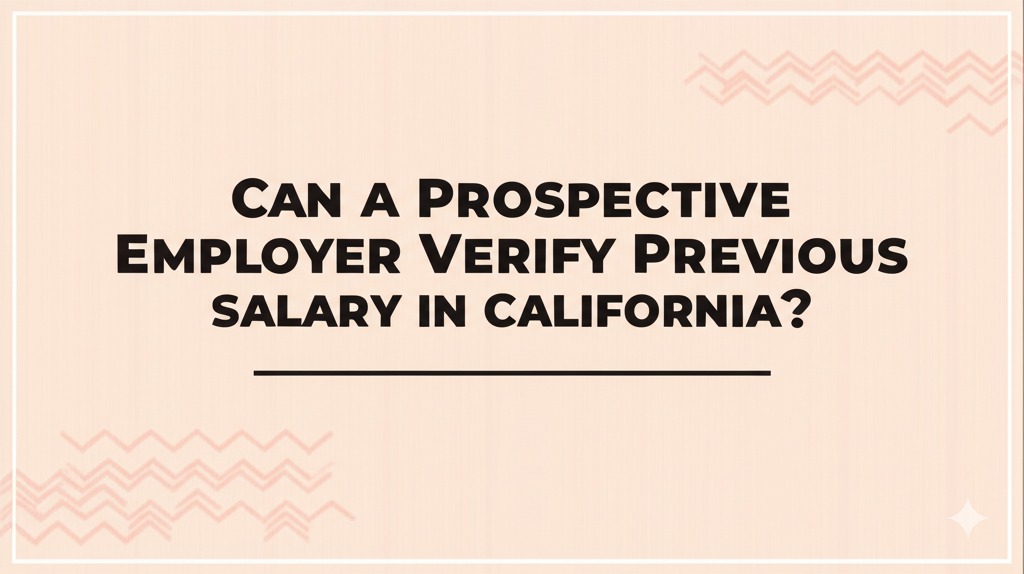
When job hunting, one common concern candidates have is whether their past salary information can impact future opportunities. In California, a state known for its employee-friendly labor laws, the rules surrounding salary history are particularly important to understand.
Can a prospective employer verify your previous salary in California? The short answer is: not legally, without your consent. But there’s more to the story. Let’s dive into what California law says, why these laws exist, and what job seekers and employers need to know.
What Does California Law Say About Salary History?
The California Salary Privacy Law
As of January 1, 2018, California law prohibits employers from:
- Asking about a job applicant’s salary history (including compensation and benefits).
- Relying on past salary as a factor in determining whether to offer a job or how much to pay.
This law is part of the California Labor Code Section 432.3 and was enacted to promote pay equity and prevent historical salary discrimination—especially against women and minorities.
What Employers Can Do
Although employers can’t ask for your past salary, they are allowed to:
- Ask about your salary expectations for the role.
- Use publicly available data (like government records) if applicable.
- Verify salary information after an offer has been made, if you voluntarily disclosed it.
Can Employers Legally Verify Your Previous Salary?
Direct Verification Is Restricted
Prospective employers in California cannot legally verify your previous salary without your consent. That means:
- They cannot call your past employers or use third-party services to get salary data unless you’ve authorized it.
- If you voluntarily disclose your salary history, the employer can verify that information, but they still cannot base the pay offer solely on it.
What Happens If They Do?
If an employer violates these rules, they may be subject to:
- Complaints or lawsuits from job applicants.
- Investigations by California’s Department of Fair Employment and Housing (DFEH).
- Fines or penalties for non-compliance.
It’s essential for both employers and candidates to understand that this law is not just a suggestion—it carries legal weight.
Why California Protects Salary Privacy
Addressing Wage Gaps
The law aims to prevent employers from using prior earnings as justification for lower offers, which can perpetuate:
- Gender-based pay gaps
- Racial or ethnic pay disparities
- Unfair compensation cycles from job to job
Encouraging Transparent Hiring Practices
By removing salary history from the equation, companies are encouraged to:
- Evaluate candidates on their qualifications, not their past pay.
- Set compensation based on market value and internal equity.
- Promote fair pay for equal work.
What Job Seekers in California Should Know
You Have the Right to Say “No”
If an interviewer asks, “How much did you make in your last role?”, you are legally entitled to respond:
“I prefer not to discuss my salary history, as per California law.”
Focus on Your Value
Instead of discussing what you earned before, come prepared to talk about:
- Your skills and experience
- Your market value
- Your salary expectations for the role
This shifts the conversation to your future potential, not your past paycheck.
What Employers Should Keep in Mind
Train Your Hiring Team
Hiring managers, recruiters, and interviewers should be:
- Educated on California’s salary privacy laws.
- Trained to avoid asking prohibited questions.
- Prepared to evaluate compensation fairly and lawfully.
Document and Standardize Compensation Policies
To avoid legal pitfalls:
- Establish clear compensation frameworks.
- Base salaries on role responsibilities and market benchmarks.
- Avoid referencing salary history—even if voluntarily provided—when setting pay.
Exceptions and Gray Areas
Public Sector Roles
For certain government positions, salary information may be part of public record. In such cases, employers may have access—but they must still comply with broader anti-discrimination laws.
Voluntary Disclosure
If a candidate voluntarily shares their salary history, employers may consider it, but they cannot:
- Ask for it directly.
- Use it as the sole reason for setting pay.
When in doubt, it’s best for employers to err on the side of caution and stick to objective criteria.
Final Thoughts: Navigating Salary History in California
In California, your salary history is your private information—and for good reason. The state’s laws are designed to foster fairness, reduce wage disparities, and ensure that job offers reflect true market value, not outdated pay.
Key Takeaways:
- Employers can’t ask for or verify salary history without your consent.
- You are not obligated to share your past salary.
- Focus on your skills, value, and expectations during salary discussions.

Andre Cuevas provides career insights, job search strategies, and professional advice to help individuals navigate the job market and achieve their career goals.





